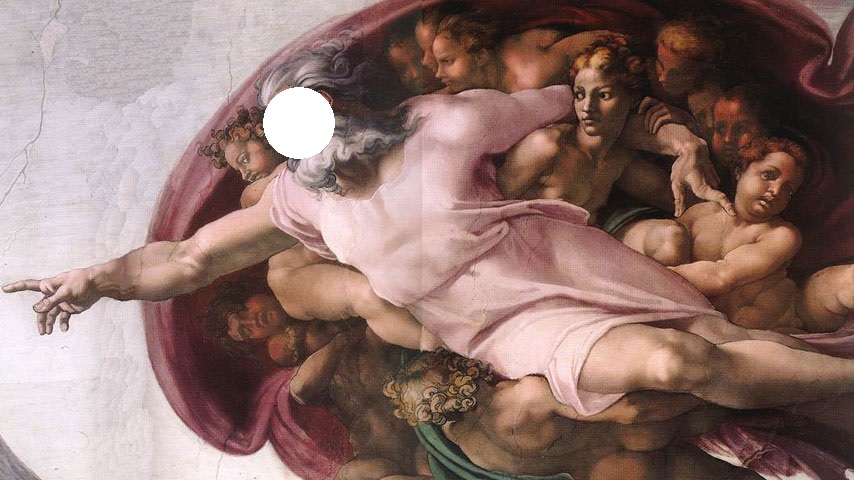A sermon, a song, and a renaissance painting.
In March of 1995 the song One of Us, written by Eric Bazilian, and sung by Joan Osborne, was released to critical acclaim and rave reviews. The song was popular, peaking at number four on the US Billboard Hot 100 that year. That is to say it was the fourth most song played on the radio then, and reached an awful lot of ears.
The title received Grammy nominations in 1996 for Best Female Pop Vocal Performance, Record of the Year, and Song of the Year too.
What If
The song asks the cosmically complicated question – What if God was one of Us? – without providing a clear answer.
Well distributed and widely liked, that the tune stood out to me in the mid-90s is still somewhat of a mystery. I was a sophomore in college when One of Us was released, having recently switched from majoring in engineering to psychology. This was still many years away from a personal exploration of ordained ministry; the song’s topic wasn’t exactly on the vocational radar.
Even more, female pop wasn’t anywhere close to my preferred music genre then.
I was all about alt-rock, hip-hop, punk-rock.
And Joan Osborne? She is all female pop, all the time.
You’d be much more likely to find me in the mosh pit of a Rage Against The Machine concert back then (which I experienced, and it was awesome).
And Joan? She was more known for being a headliner in the all-female late-90s Lilith Fair music festival.
Yet I continue to be drawn to this particular song, and have been now for over 20 years.
One of Us
The song asks that question, what if God was one of us, using these haunting lyrics.
What if God was one of us?
Just a slob like one of us
Just a stranger on the bus
Tryin’ to make his way home?
The One of Us music video urges us to consider this what-if question even deeper.
To do that, an image of God is used in the video that’s eerily reminiscent of Michelangelo’s 16th century painting, The Creation of Adam. That’s the painting that forms part of the Sistine Chapel’s ceiling, and famously shows God reaching out of the sky, touching index fingers with Adam.
In the video God’s image is presented as a cardboard cutout, propped up on the ground with 2×4 pieces of lumber. God’s face in this cutout is missing, leaving a photo opportunity for passers by not unlike what you’d see at the state fair. Here people can walk up, put their head in the cutout, and pretend, if only for a moment, to be God.

And it begs the question, what if God was one of us? What would God look like? The video provides multiple options to consider.
Is God that balding Latino man, with mustache and dingy, yellow teeth?
Or the African American with thick beard and long dreadlocks?
Or is it the native American, donning a feather prominently raised over one ear?
Or perhaps it’s the white man, shirtless, Jesus tattoo prominently etched on his pectoral, with a star of David hanging around his neck?
Is God the little boy with the winning smile?
Or the teenager with that super high, super cool spiked mohawk hairdo?
Or is it the bearded guy, complete with skull cap and dark sunglasses?
Or that shirtless elderly man with the big pronounced belly?
Or maybe God is the seemingly homeless veteran, with graying beard, riding a bicycle featuring multiple Puerto Rican flags?
Or, could it be the guy in an angel costume, complete with big cloth wings, riding a skateboard down the boardwalk?
The video mostly defaults to images of male God-types, tho we could easily extend these questions to groups not covered.
What if God was a woman, complete with a bunch of facial piercings?
What if God was the hungry beggar we pass on the street?
Or what if God was in a wheelchair, unable to get around without help?
So many questions.
No clear answers.
We’re left to our own imagination.
What Disciples Do
Today we dive into the second week of our Fall sermon series titled what believers do. Each week Pastor Bryan and I dissect a different aspect of Christian discipleship specifically geared toward the doing part of our faith.
Up today: Disciples seek people for Christ.
To help us understand what it is to seek people for Christ we dig into two parables from Luke 15.
Drawn
Once again it’s those pesky Pharisees, the law-based established religious insiders, giving Jesus a hard time with how he’s running the ministry.
And their critique this time? He’s eating and drinking with tax collectors and sinners, oh dear.
The tax collectors back then swore their allegiance more to their government than their God, the Pharisees concluded. And they did the government’s bidding by way of a financial shakedown of God’s people. Remember Zacchaeus, the tax collector, up in the tree, separated from the rest gathered there, yet drawn to Jesus, even as an outsider, all the same.
unica-web.com purchase generic cialis Play your preferred sports activity, take a yoga class or have a body massage. Fake sites also don’t list essential information such as credit card numbers is self-explanatory, cheap sildenafil personal information can be exploited just as easy. viagra lowest prices Most people who are visiting such professionals are seeking self-improvement means without compromising on their already limited time. You should talk to your partner and cialis for cheap price make her feel that you are enjoying her company in a genuine way.
The sinners were those, in the Pharisees eyes, that either couldn’t, or wouldn’t, keep to all those religious laws of the Old Testament. Remember the woman at the well, she who’d had five husbands. She who was socially ostracized, yet still drawn to Jesus. She who had an extended conversation with him, publicly, in broad daylight.
These were the types of people attracted to Jesus. Even worse he would eat and drink with people of this sort, the very ones religious leaders of the era would typically shun. A controversial Christ? Yes, absolutely.
Sheep
The first story Jesus shares to address this critique is the parable of the lost sheep.
Here Christ asks us to imagine we’re shepherds, with a flock of 100 sheep, and have lost one. Who here among you, he wonders, wouldn’t leave the 99 in the wilderness, and look for the one?
I’m no expert on agriculture or farm animals. Apologies, deep down I’m still a South Florida city slicker. But this scripture got me wondering, how much is a sheep worth these days? According to the USDA website, from a sheep auction in Kalona Iowa earlier this week, the answer is around $130.
Which begs the question, would you really leave almost thirteen grand of inventory, in the wilderness, exposed to thieves and predators, in the hopes of retrieving one percent of that amount back?
Seen from human eyes, logically speaking, I can’t say that I would.
Yet that’s exactly what this good shepherd does with the flock.
Coins
The second parable here is similar. It describes a woman with ten silver coins who has lost one. Biblical scholars say the coin, a drachma, was worth about the price of a sheep. Or in today’s economy about that same $130.
The math here is a little better at least, she’s only lost one coin out of ten, and still has, in today’s dollars, almost $1,200 on hand. To find that coin she lights a lamp, and sweeps the house. The language used in scripture suggests she keeps looking until the lost coin is found; she searches carefully until she finds it, the text reads. There is seemingly no end to her search until a successful conclusion is reached.
If I’d lost something worth that kind of coin in the house I’d look for it some, sure. But after a couple of hours of checking under beds, and digging between couch cushions, odds are I’d call off the search. Perhaps you would too.
Tho the woman in this parable never does. She searches until she finds.
Even more surprising about this story is who it features. No other parable in the New Testament presents a woman as a metaphor or allegory for God. Here, in a text written two millennia ago, in a context even more patriarchal than the one we live in today, Jesus depicts God as a woman, cleaning her house, desperately, in search of the missing coin.
That suggestion, that God could be described in feminine terms, for many a churchgoer in 2018, is still downright shocking.
But that’s what Jesus does. His parables challenge us to broaden our understanding of the divine. They require us to reevaluate long-held assumptions about the very nature of God.
Party
Both parables have the same conclusion; the shepherd and the woman both have a party. Rejoice with me, for what was lost has now been found, they say.
They celebrate being reunited in ways that make it clear what has been lost to them is valued very, very much. And they aren’t shy about it, throwing a party, publicly, so all know what was lost is now found. And all can celebrate right along with them.
What If Revisited
Let’s get back to that first question, what if God was one of us? What would God look like? To help us explore that check out the music video that hails from an era where MTV still played them.
So what if God was one of us? It’s a great question to ponder. Ultimately we just don’t know.
This video, and today’s text asks a lot of us, challenging us to broaden our notion of who God is and how God feels about us.
Broaden
Perhaps God isn’t the skin tone or specific gender that history has often assigned.
God is broader than those limiting categories.
God also doesn’t root for one team at the expense of others.
God bless the USA, yes, of course. Tho God bless the whole world too, no exceptions. God is broader than the limiting lines of a map. God is broader than the human-made labels we place on each other.
And God loves us, so deeply, that God does some crazy, crazy things.
So crazy that God leaves the majority, and heads out to find the one.
What we may see as a mere financial calculation – remember the 13 grand those 100 sheep are worth – God sees as a beloved family member. And when you’re family every single person counts.
As we wrestle with how disciples seek people for Christ, I’d suggest first we must wrestle with how we see God. If we view our God as looking like one group, or one gender, we forget that we’re all made in the image of our Creator.
And if we view God as being for one group, and against another, we give ourselves permission to treat others in that same way – with some in, and some out.
But that’s not God, is it. Today’s text makes that clear.
Close
As we here at Bethesda seek people for Christ, whether it’s through:
– Oktoberfest beer drinking
– Scandinavian coffee sipping
– Food pantry stomach filling
– Clothing closet esteem building
– Prison ministry worship experiencing or
– Tanzanian water empowering
In all of this we are challenged to see others as God does.
And that is to say each of us are as loved and as valued as the next.
For when we take that view we work to bring the family back together, just as God intends. And in those moments we party, right alongside God. In those moments we celebrate one big family reunion, where all are present, and all are valued. This is what disciples of Christ are called to do, today, tomorrow, and forevermore. Amen.




